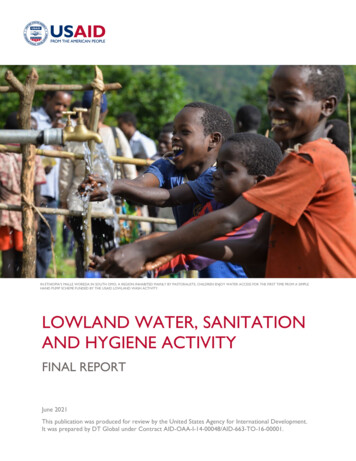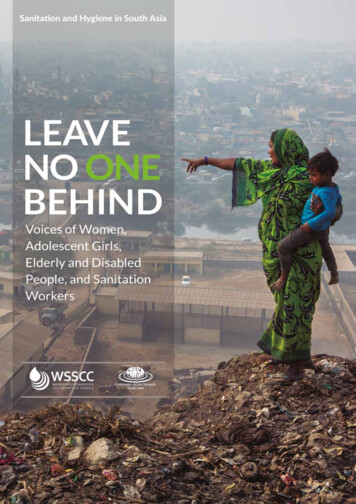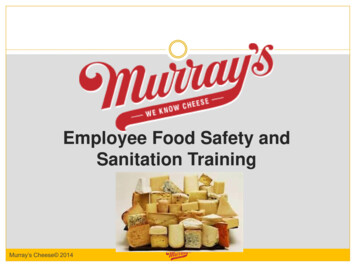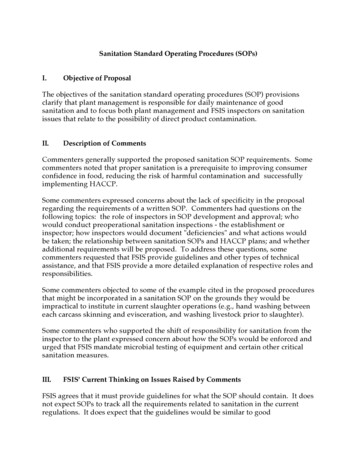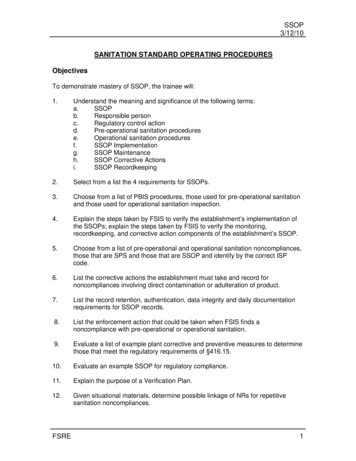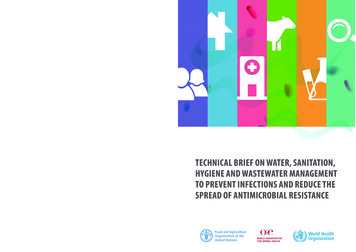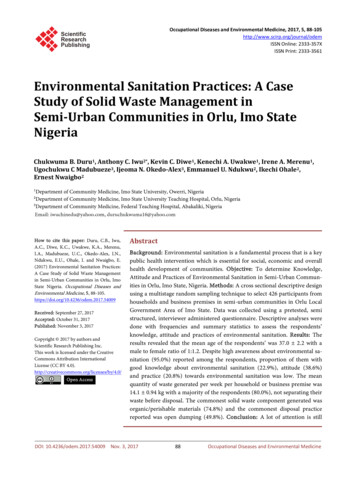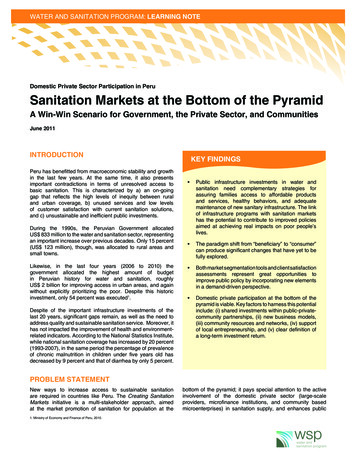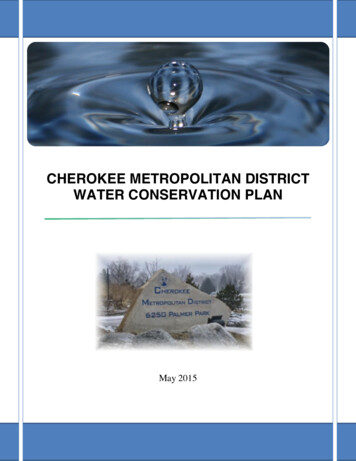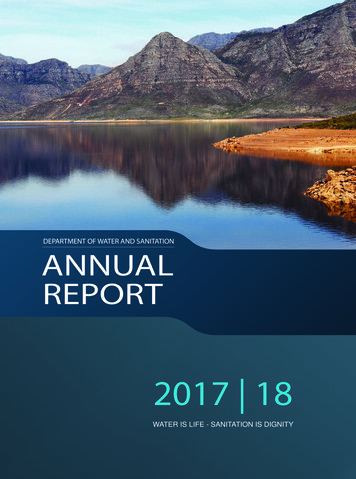
Transcription
DEPARTMENT OF WATER AND SANITATIONANNUALREPORT2017 18WATER IS LIFE - SANITATION IS DIGNITY
PART A TABLE OF CONTENTSPART A: GENERAL INFORMATION1DEPARTMENT GENERAL INFORMATION .62LIST OF ABBREVIATIONS/ACRONYMS .63FOREWORD BY THE MINISTER .114DEPUTY MINISTER STATEMENT .135REPORT OF THE ACCOUNTING OFFICER .156STATEMENT OF RESPONSIBILITY AND CONFIRMATION OF ACCURACY FOR THEANNUAL REPORT .287STRATEGIC OVERVIEW .7.1. Vision .7.2. Mission .7.3. Values .292929298LEGISLATIVE AND OTHER MANDATES.309ORGANISATIONAL STRUCTURE.3110ENTITIES REPORTING TO THE MINISTER .32PART B: PERFORMANCE INFORMATION1AUDITOR-GENERAL’S REPORT: PREDETERMINED OBJECTIVES .342OVERVIEW OF DEPARTMENTAL PERFORMANCE .2.1Service Delivery Environment .2.2Service Delivery Improvement Plan .2.3Organisational environment.2.4Key policy developments and legislative changes .34343740403STRATEGIC OUTCOME ORIENTED GOALS.424PERFORMANCE INFORMATION OF PROGRAMMES .4.1Programme 1: Administration .44444.1.1Sub-programmes .444.1.2Strategic objectives, performance indicators, planned targets and actualachievements.454.1.2.1Programme strategic objectives .454.1.2.2Performance indicators per sub-programme .464.1.2.3Strategy to overcome areas of under performance .504.1.2.4Changes to planned targets.51Sub-programme expenditure .524.1.3Annual Report for 2017/18 Financial Year Vote 36: Department of Water and Sanitation1
PART A TABLE OF CONTENTS4.2Programme 2: Water Planning and Information Management .534.2.1Sub-programmes .534.2.2Strategic objectives, performance indicators, planned targets and actualachievements.544.2.2.1Programme strategic objectives .544.2.2.2Performance indicators per sub-programme .554.2.2.3Strategy to overcome areas of under performance .594.2.2.4Changes to planned targets .604.2.3Sub-programme expenditure .604.3 Programme 3: Water Infrastructure Development .614.3.1Sub-programmes .614.3.2Strategic objectives, performance indicators, planned targets and actualachievements.624.3.2.1Programme strategic objectives .624.3.2.2Performance indicators per sub-programme .644.3.2.3Strategy to overcome areas of under performance .804.3.2.4Changes to planned targets.80Sub-programme expenditure .854.4 Programme 4: Water Sector Regulation .864.3.34.4.1Sub-programmes .864.4.2Strategic objectives, performance indicators, planned targets and actual achievements 874.4.2.1Programme strategic objectives .874.4.2.2Performance indicators per sub-programme .884.4.2.3Strategy to overcome areas of under performance .924.4.2.4Changes to planned targets.92Sub-programme expenditure .935TRANSFER PAYMENTS .5.1. Transfer payments to public entities .5.2. Transfer payments to all organisations other than public entities .9494996CONDITIONAL GRANTS .6.1. Conditional grants and earmarked funds paid.6.2. Conditional grants and earmarked funds received .1021021047DONOR FUNDS .1058CAPITAL INVESTMENT .8.1Capital investment, maintenance and asset management plan.1061064.4.32Annual Report for 2017/18 Financial Year Vote 36: Department of Water and Sanitation
PART A TABLE OF CONTENTSPART C: GOVERNANCE1INTRODUCTION.1082RISK MANAGEMENT .1083FRAUD AND CORRUPTION .1084MINIMISING CONFLICT OF INTEREST.1095HEALTH SAFETY AND ENVIRONMENTAL ISSUES.1096PORTFOLIO COMMITTEES .1097SCOPA RESOLUTIONS.1178PRIOR MODIFICATIONS TO AUDIT REPORTS .1179INTERNAL CONTROL UNIT .11910INTERNAL AUDIT AND AUDIT COMMITTEES .120PART D: HUMAN RESOURCE MANAGEMENT1INTRODUCTION.1222OVERVIEW OF HUMAN RESOURCES .1223HUMAN RESOURCES OVERSIGHT STATISTICS.124PART E: ANNUAL FINANCIAL STATEMENTS FOR THE DEPARTMENTOF WATER AND SANITATION (VOTE 36)1REPORT OF THE AUDIT COMMITTEE ON THE FINANCIAL STATEMENTS FOR THEDEPARTMENT OF WATER AND SANITATION (VOTE 36) .1822REPORT OF THE AUDITOR GENERAL TO PARLIAMENT ON VOTE 36: DEPARTMENT OFWATER AND SANITATION .1893VOTE 36 ANNUAL FINANCIAL STATEMENTS OF VOTE 36 FOR THE YEAR ENDED31 MARCH 2018 .198PART F: ANNUAL FINANCIAL STATEMENTS FOR THE WATER TRADINGENTITY1REPORT OF THE AUDIT COMMITTEE ON THE FINANCIAL STATEMENTS FOR THEWATER TRADING ENTITY .3442REPORT OF THE AUDITOR GENERAL TO PARLIAMENT ON THE WATER TRADING ENTITY .3503ANNUAL FINANCIAL STATEMENTS OF THE WATER TRADING ENTITY FOR THE YEARENDED 31 MARCH 2018 .356Annual Report for 2017/18 Financial Year Vote 36: Department of Water and Sanitation3
PART A TABLE OF CONTENTSList of figuresFigure 1: Operating deficit for 2017/18.23Figure 2: Revenue analysis.24Figure 3: Total expenditure .25Figure 4: Backlog on maintenance due to decreasing budget allocation .37List of tablesTable 2.2.1: Main services and standards .38Table 2.2.2: Batho Pele arrangements with beneficiaries .38Table 2.2.3: Service delivery information tool .39Table 2.2.4: Complaints mechanism .394Annual Report for 2017/18 Financial Year Vote 36: Department of Water and Sanitation
PART A GENERAL INFORMATIONPART AGENERALINFORMATIONAnnual Report for 2017/18 Financial Year Vote 36: Department of Water and Sanitation5
PART A GENERAL INFORMATION126DEPARTMENT GENERAL INFORMATIONPHYSICAL ADDRESS185 Francis Baard StreetPretoria0001POSTAL ADDRESSPrivate Bag X313Pretoria0001TELEPHONE NUMBER(012) 336 7500FAX NUMBER(S)012 323 4470 or 012 326 2715EMAIL ADDRESSCentralp@dws.gov.zaWEBSITE ADDRESSwww.dws.gov.zaLIST OF ionACIPAccelerated Community Infrastructure ProgrammeAGSAAuditor General of South AfricaAMDAcid Mine DrainageAMPAsset Management PlanAOAccounting OfficerAPPApproved Professional PersonBBBEEBroad Based Black Economic EmpowermentBDSBulk Distribution SystemBECBid Evaluation CommitteeBEEBlack Economic EmpowermentBRVASBerg River – Voëlvlei Augmentation SchemeBWSBulk Water SupplyCAPEXCapital ExpenditureCEChief ExecutiveCFOChief Financial OfficerCHDMChris Hani District MunicipalityCMACatchment Management AgencyCRCCommunity Representative CommitteeDBACDepartmental Bid Adjudication CommitteeAnnual Report for 2017/18 Financial Year Vote 36: Department of Water and Sanitation
PART A GENERAL tmental Bargaining ChamberDDGDeputy Director-GeneralDEADepartment of Environmental AffairsDGDirector-GeneralDIRCODepartment of International Relations and CooperationDMDistrict MunicipalityDMRDepartment of Mineral ResourcesDoRADivision of Revenue ActDPMEDepartment of Planning Monitoring and EvaluationDPSADepartment of Public Service and AdministrationDWSDepartment of Water and SanitationECEastern CapeECLEnvironmental Critical LevelEIAEnvironmental Impact AssessmentELUExisting Lawful UseEMEExempted Micro EnterpriseERCExecutive Risk CommitteeETLExtract Transform LoadEUEuropean UnionEWSETAEnergy and Water Sector Education and Training AuthorityeWULAASElectronic Water Use Licence Application SystemFBSanFree Basic SanitationFDIForeign Direct InvestmentFIDICInternational Federation of Consulting EngineersFOSADForum for South African Directors-GeneralFSFree StateFYFinancial YearGAGeneral AuthorisationGCCGovernment Certificate of CompetencyGCISGovernment Communication and Information SystemGISGeographic Information SystemGLeWAPGreater Letaba Water Augmentation ProjectGPGautengGRAPGenerally Recognised Accounting PracticeGWSGovernment Water SchemeAnnual Report for 2017/18 Financial Year Vote 36: Department of Water and Sanitation7
PART A GENERAL ro-Electric Power PlantHODHead of DepartmentHRHuman ResourcesIAImplementing AgentIESBAInternational Ethics Standards Board for AccountantsIRSImplementation Readiness StudyISAInternational Standards on AuditingJSEJohannesburg Stock ExchangeKSDKing Sabata DalindyeboKZNKwaZulu-Natall/c/dLitre per capita per dayLGSETALocal Government Sector Education and Training AuthorityLMLocal MunicipalityLPLimpopom2Metre squaredm3Cubic metreMCSModified Cash StandardMECMember of Executive CouncilMIIFMunicipal Infrastructure Investment FrameworkMlMegalitreMl/dMegalitre per daymmMillimetresMMSMiddle Management ServiceMPMpumalangaMPATManagement Performance Assessment ToolMTEFMedium Term Expenditure FrameworkMTSFMedium-Term Strategic FrameworkMWIPMunicipal Water Infrastructure ProgrammeN/ANot ApplicableNANational AssemblyNAMPNational Asset Management PlanNCNorthern CapeNCOPNational Council of ProvincesNDPNational Development PlanNEDLACNational Economic Development and Labour CouncilNRWNon-revenue waterAnnual Report for 2017/18 Financial Year Vote 36: Department of Water and Sanitation
PART A GENERAL al TreasuryNWNorth WestNWANational Water ActNWRINational Water Resources InfrastructureNWRS-2Second National Water Resources StrategyNWSMPNational Water and Sanitation Master PlanNWSRSNational Water and Sanitation Resources StrategyOCSLAOffice of the Chief State Law AdviserOFOOrganising Framework for OccupationOHSOccupational Health and SafetyOPEXOperational ExpenditureOPPOffice of the Public ProtectorORWRDPOlifants River Water Resource Development ProjectOSDOccupation Specific DispensationPAAPublic Audit ActPFMAPublic Finance Management ActPKWPiano Key WeirQSEQualifying Small EnterpriseRBIGRegional Bulk Infrastructure GrantRDPReconstruction and Development ProgrammeRIDRecord of Implementation DecisionRWRand WaterRWSRegional Water SchemeSADCSouthern African Development CommunitySALGASouth African Local Government AssociationSCMSupply Chain ManagementSCOPAStanding Committee on Public AccountsSDGSustainable Development GoalSDIPService Delivery Improvement PlanSIPStrategic Infrastructure ProjectSITAState Information Technology AgencySIUSpecial Investigation UnitSIVSystem Input VolumeSLAService Level AgreementSMARTSpecific Measurable Achievable Realistic Time-boundAnnual Report for 2017/18 Financial Year Vote 36: Department of Water and Sanitation9
PART A GENERAL all Medium and Micro EnterprisesSMSSenior Management ServiceStatsSAStatistics South AfricaSWPNStrategic Water Partners NetworkTCTATrans Caledon Tunnel AuthorityTRTreasury RegulationsTRATemporary Relocation AreasVIPVentilated Improved PitWARMSWater Registration Management SystemWBWater BoardWCWestern CapeWCDMWater Conservation Demand ManagementWMIWater Management InstitutionWMSWater Management SystemWRCWater Research CommissionWSWater SchemeWSAWater Service AuthorityWSDPWater Sector Development PlanWSIGWater Services Infrastructure GrantWSSWater Supply SchemeWTEWater Trading EntityWTPWater Treatment PlantWTWWater Treatment WorkWULAWater Use License ApplicationWULATSWater Use License Application Tracking SystemWWTPWastewater Treatment PlantWWTWWastewater Treatment WorkAnnual Report for 2017/18 Financial Year Vote 36: Department of Water and Sanitation
PART A GENERAL INFORMATION3FOREWORD BY THE MINISTEROver the years, South Africa has built many dams which haveserved a number of purposes – supplying water for domestic andindustrial use, for irrigation purposes, to manage/control floodsand to meet energy needs (hydro-power).Some of the critical benefits from water infrastructure development are:Mr Gugile Nkwinti, MPMinister of Water andSanitation Regional development (the Lesotho Highlands Water Development Project as acase in point), job creation and industrial development; Income from export earnings, either through direct sale of cash crops or processedproducts; Urbanisation and tourism development; Skills development and social empowerment; and Investment opportunities and entrepreneurship development.Water infrastructure development funding should not always be based, or determinedon the basis of there being an off-taker for the water. The water infrastructure is itself, astimulant to economic development; but over time. The Gariep Dam is a case in point.Let me conclude this foreword by making a brief reference to the most topical mattercurrently in the country – the pollution of the Vaal River System. This is indeed a veryserious matter. Whatever else causes the pollution of the Vaal River System, threecausal factors stand out:(a) Social conditions along and crisscrossing the system:(i)Human settlements with poor or no decent sanitation; and(ii)Informal settlements with no sanitation services at all(b) Wastewater treatment works:(i)Poor or no operation and maintenance by responsible public agencies; and(ii)Deliberate destruction of water and sanitation infrastructure during workplaceconflicts or copper-cable theft.Annual Report for 2017/18 Financial Year Vote 36: Department of Water and Sanitation11
PART A GENERAL INFORMATION(c) Industries(i)Ineffective enforcement of compliance by public agencies responsible for the task, includingwithdrawal of water use licenses; and(ii)Poor or lack of consequence management within industries themselvesWhat then is to be done?To achieve immediate results all wastewater treatment works should be declared National Key Points, withnational government taking full responsibility for their construction, operation and maintenance. Water is afundamental pillar of national security.Currently, collaboration by the three spheres of government and the Sebokeng community has resulted instability being brought back around the biggest polluter, the Sedibeng Regional Sewer Scheme (SRSS).Resources have been galvanised to bring back to functionality all the pump stations and sewer dams thathad been rendered dysfunctional during community protests. We thank the Sebokeng community andleadership for not damaging a thing during protests.Nkwinti G E (MP)Minister of Water and SanitationDate: 21 September 201812Annual Report for 2017/18 Financial Year Vote 36: Department of Water and Sanitation
PART A GENERAL INFORMATION4DEPUTY MINISTER STATEMENTA new dawn is upon us as the Department of Water and Sanitationcelebrates the Centenary of Struggle Heroes, Nelson RolihlahlaMandela and Albertina Sisulu, who would have been 100 years oldthis year. It is incumbent upon us to intensify service delivery in thespirit of these anti-apartheid activists in line with the President’scall in his State of the Nation Address for a leaner, more efficientand more productive State that serves the most vulnerable in ourMrs P Tshwete, MPDeputy MinisterWater and Sanitationeconomy.As we hope for a turn around with regards to the debilitating hydrological drought overthe last four years, i.e. since 2014, in a water scarce country like ours, all hands must beon deck to save water and reduce demand; this must be “our new normal”. South Africa,after all, is a country with one of the highest per capita domestic water consumptionlevels in the world. The Department has been implementing a multi-pronged approachtowards the drought by intervening through short, medium and long term programmes.Our disaster management efforts included refurbishment of existing boreholes, springprotection and emergency water transfers, amongst others.By developing a National Water and Sanitation Master Plan tabled in Cabinet, theDepartment will soon be better able to articulate steps that need to be taken to ensurethat we avert water and sanitation crises and mitigate the impact of this natural drought.The Master Plan galvanises the Water Family to work in-sync in response to currentdemand projections, under the current budgetary constraints defined in the country’sfinancial outlook for 2018. Doing more with less is now a motto of the department.The Master Plan re-engineers the way water and sanitation services are provided. Itwill guide investment planning for the development of water resources and sanitationservices until 2030 as per the prescripts of the National Development’s Plan (NDP),South Africa’s Vision 2030 as we know it. Coordinated planning by each stakeholderin the water value chain presents many opportunities for the formation of strong andsustainable partnerships that will realise a water secure future by 2030.There is a need to strengthen weak water infrastructure which is the mandate of theDepartment. Storage in the form of dams will support high rainfall so that there is waterduring drier seasons. The anticipated budget reprioritisation will allow the Minister to reactivate infrastructure projects such as the Clanwilliam Dam in the Western Cape andthe Giyani Water Treatment Programme in Limpopo where many are awaiting waterservices in anticipation. The Department of Water and Sanitation led by Minister GugileNkwinti will deliver!Annual Report for 2017/18 Financial Year Vote 36: Department of Water and Sanitation13
PART A GENERAL INFORMATIONThe creation of technical expertise to implement departmental plans requires greater and more focusedinvestment in the talent of underprivileged youth. In line with the Five Pillars of Transformation Agendaintroduced by Minister Nkwinti, artisanal skills training is being provided to 10 000 unemployed youth whowill be deployed to Water Services Authorities or to initiate their own enterprises upon graduation to combatwater leaks in communities. As reported in budget speeches, the programme of repairing the water pipesto prevent the water leaks will now fall under the Infrastructure and Maintenance branch with a dedicatedbudget.The learners in the first phase of this training are scheduled to complete their training in September 2018.We are grateful to those Water Services Authorities (Municipalities) who have absorbed or offered on-thejob training to trainee Artisans.The Department is now intensifying its programmes to enhance the participation and benefit of Black-Ownedand Women-Led entities in the procurementIn order to renew the confidence of our people, the Minister is undertaking a Transformation Agendaunderpinned by Five Pillars of Transformation. This Agenda strives to hear the needs of broader society andoperationalise projects crucial for the upliftment and empowerment of all segments of society.With respect to sanitation services delivery, the Department made presentations to the Portfolio Committeeon progress made in the Bucket Eradication Programme in formal settlements, indicating progress,challenges and corrective measures. We are ensuring focused attention on this programme and will table areport on progress we have made to ensure that we meet the targets we have set for ourselves. This workin progress must be fast-tracked as part of a longer-term infrastructure development for those vulnerable topoverty.I must thank the Minister of Water and Sanitation, Mr GE Nkwinti, for his intention to steer this ship ontocalmer seas. Further, we call upon all departmental officials and members of the Water Family to hold fastin the resolve to support the Minister and I as we undertake the task of sustainably delivering sufficient andsafe drinking water, and dignified sanitation to million s of people in our society.Mrs P Tshwete (MP)Deputy Minister of Water and SanitationDate: 21 September 201814Annual Report for 2017/18 Financial Year Vote 36: Department of Water and Sanitation
PART A GENERAL INFORMATION5REPORT OF THE ACCOUNTING OFFICER5.1Overview of the operations of the departmentThe Department of Water and Sanitation is entrusted with a huge responsibility of thelives and dignity of South Africans as encapsulated in the slogan “Water is Life andSanitation is Dignity”.Water is a catalyst for economic development and as such the DWS has to remainalive to the fact that delivering on this mandate of ensuring water security for both basichuman need and economic development is not an option but a must. It is along thisvery understanding that throughout the year the Department continued on deliveringsanitation and integrated water services and resource management through its linefunction programs and support services as follows:Ms Deborah MochotlhiActing Director-GeneralAdministrationThe graduate training programme is essential to the recruitment, training anddevelopment of the young professionals to address the twin challenges of skillsshortage and succession planning in the Department. Since its inception 2007 theLearning Academy has awarded 842 bursaries in the science and engineering fields,in 22 South African universities. Of the 842, 410 were in engineering, field of study,350 in sciences and 43 studied surveys. The Learning Academy’s approach in dealingwith skills development starts at university level through the bursary programme, andthen the provision of experiential learning to graduates after completing their universitystudies. The experiential learning also provided an opportunity to the graduates to fulfilthe mandatory requirements registration with professional bodies. For the year underreview, the Department has a complement of 267 graduates performing remuneratedcandidacy work.The Department’s focus was also on the training of senior managers with the aimof improving the competencies and skills gap identified through the competencyassessments undertaken in 2016/17. To this end, 107 senior managers attendedtraining courses in management, finance, employee relations and leadership.During the period under review, the Department continued with the implementation ofthe Annual International Relations Implementation plans. Through this plan, four (4)young people benefitted from the RSA/Japan relationship where they were trained inJapan and received Masters Degrees, 3 in Engineering and 1 in International Relations.In addition, RSA received support to the value of R55 million from the Japan InternationalCooperation Agency (JICA). This support is for the construction of a training centreand will enhance capacity building of the water sector (including municipalities) inwater management. From its relationship with Belgium, RSA received support to thevalue of R2 million with a view to support a pilot project on Sanitation technologies inSaldanha Bay Municipality. Furthermore, two Memorandum of Understandings (MoUs)were signed with Spain and Hungary on cooperation in the field of water resourcesmanagement.Annual Report for 2017/18 Financial Year Vote 36: Department of Water and Sanitation15
PART A GENERAL INFORMATIONSo
ETL Extract Transform Load EU European Union EWSETA Energy and Water Sector Education and Training Authority eWULAAS Electronic Water Use Licence Application System FBSan Free Basic Sanitation FDI Foreign Direct Investment FIDIC International Federation of Consulting Engineers FOSAD Forum for South African Directors-General FS Free State FY .
